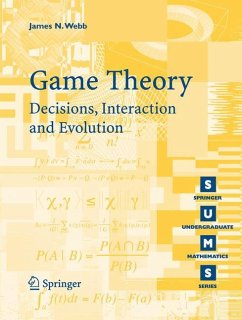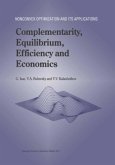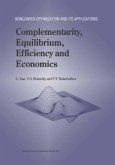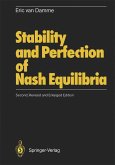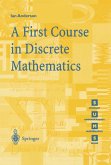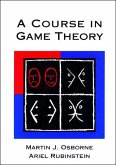The outstanding feature of this book is that it provides a unified account of three types of decision problem. It covers the basic ideas of decision theory, classical game theory, and evolutionary game theory in one volume. No background knowledge of economics or biology is required as examples have been carefully selected for their accessibility. Detailed solutions to the numerous exercises are provided at the back of the book, making it ideal for self-study. This introduction to game theory is intended as a first course for undergraduate students of mathematics, but it will also interest advanced students or researchers in biology and economics.
This book is an introduction to game theory from a mathematical perspective. It is intended to be a ?rst course for undergraduate students of mathematics, but I also hope that it will contain something of interest to advanced students or researchers in biology and economics who often encounter the basics of game theory informally via relevant applications. In view of the intended audience, the examples used in this book are generally abstract problems so that the reader is not forced to learn a great deal of a subject - either biology or e- nomics - that may be unfamiliar. Where a context is given, these are usually "classical" problems of the subject area and are, I hope, easy enough to follow. The prerequisites are generally modest. Apart from a familiarity with (or a willingness to learn) the concepts of a proof and some mathematical no- tion, the main requirement is an elementary understanding of probability. A familiarity with basic calculus would be useful for Chapter 6 andsomeparts of Chapters 1 and 8. The basic ideas of simple ordinary di?erential equations are required in Chapter 9 and, towards the end of that chapter, some familiarity with matrices would be an advantage - although the relevant ideas are brie?y described in an appendix.
Hinweis: Dieser Artikel kann nur an eine deutsche Lieferadresse ausgeliefert werden.
This book is an introduction to game theory from a mathematical perspective. It is intended to be a ?rst course for undergraduate students of mathematics, but I also hope that it will contain something of interest to advanced students or researchers in biology and economics who often encounter the basics of game theory informally via relevant applications. In view of the intended audience, the examples used in this book are generally abstract problems so that the reader is not forced to learn a great deal of a subject - either biology or e- nomics - that may be unfamiliar. Where a context is given, these are usually "classical" problems of the subject area and are, I hope, easy enough to follow. The prerequisites are generally modest. Apart from a familiarity with (or a willingness to learn) the concepts of a proof and some mathematical no- tion, the main requirement is an elementary understanding of probability. A familiarity with basic calculus would be useful for Chapter 6 andsomeparts of Chapters 1 and 8. The basic ideas of simple ordinary di?erential equations are required in Chapter 9 and, towards the end of that chapter, some familiarity with matrices would be an advantage - although the relevant ideas are brie?y described in an appendix.
Hinweis: Dieser Artikel kann nur an eine deutsche Lieferadresse ausgeliefert werden.
"This book is an undergraduate textbook devoted to the study of Game Theory to mathematicians. ... the book is well written and it is one of the best books as a first course in game theory. The book is focused on mathematics students but it can be easily used to students in other fields such as business, economics and biology. ... I strongly recommend this book to the enthusiast of game theory." (Philosophy, Religion and Science Book Reviews, bookinspections.wordpress.com, June, 2016)
"This is supposed to be a mathematical introduction to game theory for undergraduate students. I think both students of economics and mathematics (both with a course of calculus, linear algebra and optimization in Rn) can use this book. The idea of the book is to provide the 'intuition' behind some important theorems of game theory." (Philosophy, Religion and Science Book Reviews, bookinspections.wordpress.com, March, 2014)
"A single-semester elective course in game theory would be an attractive feature of any undergraduate mathematics program. Students would get to use the various mathematical skills they have acquired in a thought-provoking applied context. The book under review is intended as a textbook for such a course. ... Certainly the choice of topics and overall organization is good." (David P. Roberts, MathDL, August, 2007)
"This is supposed to be a mathematical introduction to game theory for undergraduate students. I think both students of economics and mathematics (both with a course of calculus, linear algebra and optimization in Rn) can use this book. The idea of the book is to provide the 'intuition' behind some important theorems of game theory." (Philosophy, Religion and Science Book Reviews, bookinspections.wordpress.com, March, 2014)
"A single-semester elective course in game theory would be an attractive feature of any undergraduate mathematics program. Students would get to use the various mathematical skills they have acquired in a thought-provoking applied context. The book under review is intended as a textbook for such a course. ... Certainly the choice of topics and overall organization is good." (David P. Roberts, MathDL, August, 2007)

